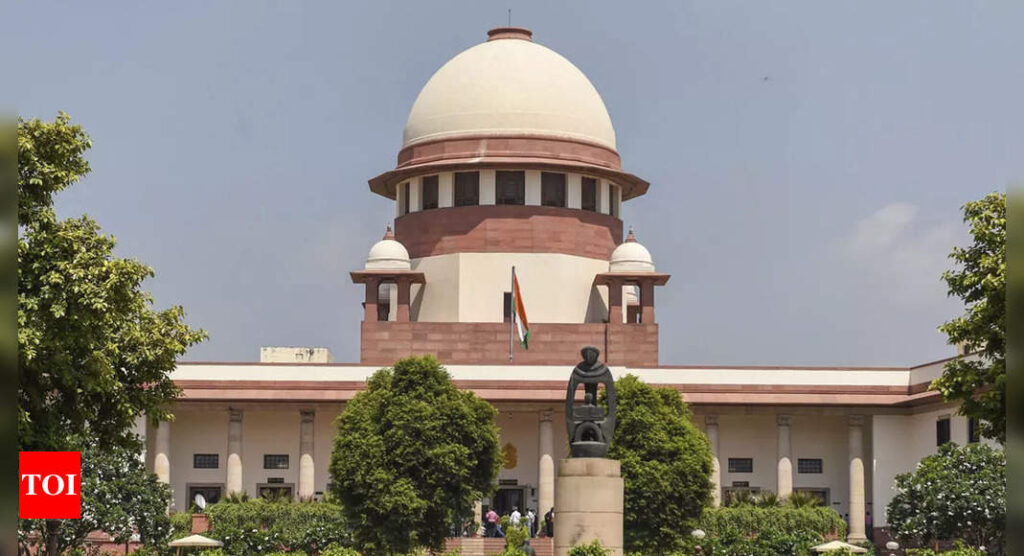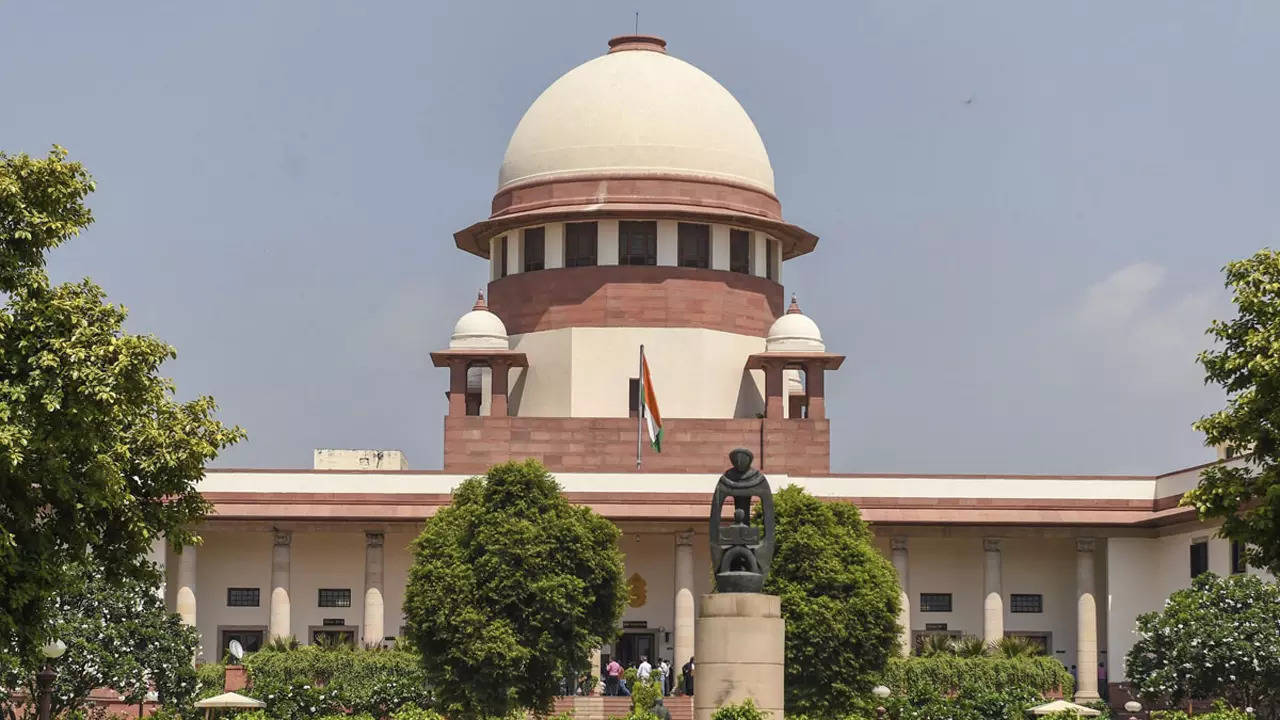[ad_1]
NEW DELHI: The Indo-Bangladesh border fencing project has been hindered due to non-cooperation of the West Bengal government and pending land acquisition issues in the state, the Centre told the Supreme Court on Tuesday during the hearing of petitions challenging Section 6A of the Citizenship Act related to grant of Indian citizenship to illegal immigrants in Assam.
Solicitor General Tushar Mehta, appearing for the Centre, told a five-judge constitution bench headed by Chief Justice DY Chandrachud that the Union government has taken multi-pronged steps to secure the Indo-Bangalesh border.
The law officer told the apex court that West Bengal shares a 2,216.7 km border with Bangladesh and 81.5 per cent fencing has been done. All efforts are being made to secure the remaining length through fencing or technological solutions.
“It is submitted West Bengal Government follows a far slower, more complex direct land purchase policy. Even for national security purposes like border fencing, there is non-cooperation by the state government. If the State of West Bengal cooperates in acquiring the land and hands over the land for fencing, the central government will do so,” Mehta told the bench, also comprising Justices Surya Kant, M M Sundresh, J B Pardiwala and Manoj Misra.
The SG explained before the court the steps taken to curb the influx of illegal immigrants, particularly the states in the North-East.
The top court, which reserved its order on the petitions challenging the constitutional validity of Section 6A, also heard submissions of senior advocates Shyam Divan and Kapil Sibal.
Divan submitted there was no temporal limit to the operation of Section 6A and individuals could still apply for citizenship under it.
He said there existed no mechanism for evaluating, assessing, or determining the grant of citizenship under Section 6A(2).
The bench reserved order on 17 petitions questioning the constitutional validity of Section 6A, which was inserted into the Citizenship Act as a special provision to deal with the citizenship of people covered under the Assam Accord.
It says those who came to Assam on or after January 1, 1966 but before March 25, 1971 from specified territories, including Bangladesh, in accordance with the Citizenship Act amended in 1985, and since then are residents of the northeastern state, must register themselves under Section 18 for acquiring Indian citizenship.
As a result, the provision fixes March 25, 1971 as the cut-off date for granting citizenship to migrants, particularly those from Bangladesh, residing in Assam.
The Centre has told the court in an affidavit that it is not possible to collect data of illegal migrants living in various parts of the country as entry of foreign nationals is clandestine and surreptitious.
It informed the apex court that 17,861 people have been granted citizenship under Section 6A.
Answering the court’s query, the Centre said 32,381 foreigners have been detected under the orders of foreigners tribunal with reference to the period 1966-1971.
The top court had earlier directed the Centre and the Assam government to provide extensive data, including those on the number of Bangladeshi immigrants granted Indian citizenship in Assam between January 1, 1966 and March 25, 1971, while taking note of pleas that illegal immigration has impacted the demography and cultural fabric of the border state.
Solicitor General Tushar Mehta, appearing for the Centre, told a five-judge constitution bench headed by Chief Justice DY Chandrachud that the Union government has taken multi-pronged steps to secure the Indo-Bangalesh border.
The law officer told the apex court that West Bengal shares a 2,216.7 km border with Bangladesh and 81.5 per cent fencing has been done. All efforts are being made to secure the remaining length through fencing or technological solutions.
“It is submitted West Bengal Government follows a far slower, more complex direct land purchase policy. Even for national security purposes like border fencing, there is non-cooperation by the state government. If the State of West Bengal cooperates in acquiring the land and hands over the land for fencing, the central government will do so,” Mehta told the bench, also comprising Justices Surya Kant, M M Sundresh, J B Pardiwala and Manoj Misra.
The SG explained before the court the steps taken to curb the influx of illegal immigrants, particularly the states in the North-East.
The top court, which reserved its order on the petitions challenging the constitutional validity of Section 6A, also heard submissions of senior advocates Shyam Divan and Kapil Sibal.
Divan submitted there was no temporal limit to the operation of Section 6A and individuals could still apply for citizenship under it.
He said there existed no mechanism for evaluating, assessing, or determining the grant of citizenship under Section 6A(2).
The bench reserved order on 17 petitions questioning the constitutional validity of Section 6A, which was inserted into the Citizenship Act as a special provision to deal with the citizenship of people covered under the Assam Accord.
It says those who came to Assam on or after January 1, 1966 but before March 25, 1971 from specified territories, including Bangladesh, in accordance with the Citizenship Act amended in 1985, and since then are residents of the northeastern state, must register themselves under Section 18 for acquiring Indian citizenship.
As a result, the provision fixes March 25, 1971 as the cut-off date for granting citizenship to migrants, particularly those from Bangladesh, residing in Assam.
The Centre has told the court in an affidavit that it is not possible to collect data of illegal migrants living in various parts of the country as entry of foreign nationals is clandestine and surreptitious.
It informed the apex court that 17,861 people have been granted citizenship under Section 6A.
Answering the court’s query, the Centre said 32,381 foreigners have been detected under the orders of foreigners tribunal with reference to the period 1966-1971.
The top court had earlier directed the Centre and the Assam government to provide extensive data, including those on the number of Bangladeshi immigrants granted Indian citizenship in Assam between January 1, 1966 and March 25, 1971, while taking note of pleas that illegal immigration has impacted the demography and cultural fabric of the border state.
[ad_2]
Source link











More Stories
Congress replaces Kamal Nath, names an OBC as Madhya Pradesh chief | India News
Fire breaks out in ITBP camp in Srinagar; none hurt | India News
Parliament Security: Co-villagers give clean chit to Lalit Jha, parents to move court | India News